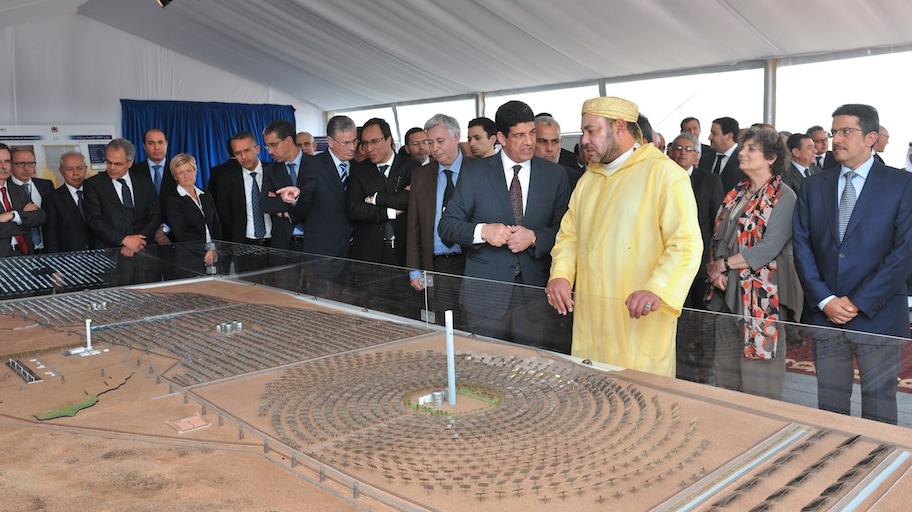Updated
Morocco’s Global Network Continues to Grow – Jean AbiNader
Islamic Banking and High-Value Investments Attract New Partners

Photo: MAP
Jean R. AbiNader, MATIC
March 12, 2015

Jean R. AbiNader, Exec. Dir., Moroccan American Trade and Investment Center
In a country like Morocco, which imports more than 95 percent of its energy, relies on a variable agricultural sector for upwards of 20 percent of its GDP, and works with international partners for large-scale infrastructure and economic development projects, public-private partnerships (PPPs) are an important option in creating the best model for attracting investments. These partnerships help to create the economic environment that both international and domestic investors are looking for – a stable, reliable financial system that treats profitability and performance as equally important.
In fact, Morocco’s power sector, back in 1997, inaugurated its first private sector owned power company and has continued the trend ever since. Now Morocco is poised for a complete shift to public-private partnerships for power, water treatment, electricity generation, hydrocarbons exploration and production, and refining, among other infrastructure projects, such as the high-speed train from Tangier to Casablanca.
What makes Morocco’s strategy significant is that the government recognizes that its role is not to manage but to regulate, participate in the financing, and make sure that local sensibilities are taken into consideration in project development and execution, and that projects conform to the national strategy for the sector.
The energy sector continues to attract international investors, ranging from the contract with Temsol in 2007 to provide power to more than 690 rural villages, to the 2013 award to the ACWA-led consortium building the CSP solar power plant in Ouarzazate, to the recent contracts with the French consortium building the high-speed train that is responsible for providing power for the rail system.
And there is a new player in the private-public partnerships in Morocco. This past week, Abengoa, an international company that applies innovative technology solutions for sustainability in the energy and environment sectors, began construction of a desalination plant in Agadir. Once again, Morocco is playing its part through partial financing provide by InfraMaroc, the infrastructure arm of CDG Capital – the pension fund investment authority.
The project plans to supply 100,000 cubic meters per day of drinking water to the half-million local residents, which will also spur tourism and agriculture, the main economic drivers of the region. This is an innovation for the National Office of Electricity and Energy (ONEE), which until this time has ventured primarily into wind farms and hydroelectric power generation.
It is the first PPP in the sector and will be the largest capacity desalination plant in the region, according to Abengoa. The capacity of the plant can be doubled as the demand increases. Given the difficulty in predicting adequate rainfall, this is a boon to the economic stability of the region, and fits Abengoa’s goal of working in areas that face increased challenges in securing adequate supplies of drinking water.
Financing Development
While these are important accomplishments and show the results of well-designed PPPs, still more needs to be done to secure investment capital. As promised last year, Morocco is opening up its financial system to include Islamic finance, which focuses on lending related to equity rather than debt.
According to a recent article in the UAE paper, The National, “Morocco is poised to have its first full-fledged Islamic bank as early as September as the only North African country rated investment grade seeks to tap the $1.8 trillion industry.” What is significant in the statement is that while other countries, such as Tunisia, may have Islamic banks, only Morocco has an investment grade rating. This is critical, since investors, being masters at risk mitigation, will look at those countries where there is sufficient expertise, credibility, and viability in the financial system before investing.
The bank is Dar Assafaa, owned by AttijariWafa Bank, and it will be the country’s first fully compliant Islamic financial institution. This follows the law passed in January that regulates Islamic financial products and provides the regulations for establishing local and foreign Islamic banks.
According to the chairman of the Moroccan Association of Participative Financiers, Said Amaghdir, “Morocco’s financing needs are huge, especially in project finance, and the stability we enjoy here will act in favor of Morocco.” The association estimates that total investment in Islamic financial products will reach $7 billion by 2018, much of it in capital goods and services, including housing, infrastructure, vehicles, and equipment.
The president/CEO of AttijariWafa, Mohamed El Kettani, noted that “Islamic finance may account for as much as 10 per cent of the total banking assets within 10 years.” He added, “We are already a market leader and we aim to stay the leader under the new law.” Investors are already signaling their enthusiasm for the new venture. “There’s political will with the government adopting this law and preparing for the sukuk [Islamic bonds] issuance,” said Montasser Khelifi, a Dubai-based senior manager at Quantum Investment Bank. “With Tunisia suffering from the Arab Spring, North Africa was relatively unattractive, while Morocco remains attractive for European investors.”
Morocco continues to put together all the ingredients for continuing to attract partners for meeting its development goals. It has the international reputation, track record, experience, regulatory environment, and now expanded access to project finance to continue its progress.